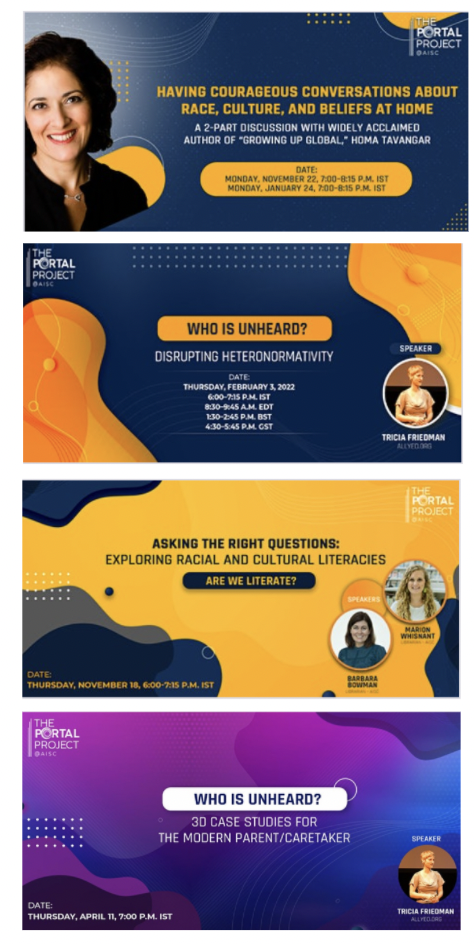As you may know, the school added a pathway to the 2021/2022 Futures Plan in support of Diversity and Equity. It reads:

The goal related to this pathway for this academic year was: To build understanding of diversity, equity and international mindedness at AISC through sustainable professional development, community events and auditing and revising published policies.
Below please find a few examples of some of the accomplishments from this year. None would have happened without the dedication of our Diversity & Equity Council.
Community Events
Community events we offered to faculty, staff, students and parents throughout the year.
 Portal Project
Portal Project
In both the educator and parent editions of the Portal Project, focused sessions were offered to explore the question of “Who is Unheard.” Specifically, Tricia Friedman offered a session on “Challenging Heteronormativity” as well as “3D Case Studies for the Modern Caregiver.” Homa Tavangar offered a two part parent discussion exploring courageous conversations about race, culture and beliefs at home. Finally, our very own Marion Whisnant and Barbara Bowman offered a session exploring racial and cultural literacies both as part of the Portal Project and on the March 21 All-School PD day.
GOA Flex Course and Discovery Day Activities
Last October, nine HS students opted to take a GOA flex course, Conversations about Race, and shared together in lunch conversations. From this, a 12th grade IB student created a November Discovery Day activity as his CAS project. Both opportunities helped students expand their comfort zone; using poetry and video stories, students conversed about culture, the complexities of identities, and implicit bias. Moving forward, we plan to regularly seek ways for HS students to opt into these types of discussions.
Auditing and Revising Policy
DEIJ Board Policy
The council drafted a board policy for Diversity, Equity, Inclusion and Justice for board consideration. This draft policy went through a number of reads and revisions at the board committee and full board level. The board will vote on the policy in May. If passed, the policy makes way for DEIJ work related to admissions, educational programming and employment. The board also requested that the team author an outward facing DEIJ statement for our new website.
DEIJ Vocabulary
The council developed a DEIJ vocabulary database that covers race and culture, gender sexuality, neurodiversity and accessibility, and large DEIJ concepts. The database has been workshopped with several groups to gauge our present comfort and familiarity with the usage of these words within some documents that we crafted for each division. Moving ahead to the 2022-2023 school year, the council will develop more exemplar documents, create an accessible database with refined vocabulary, and provide workshops for the vocabulary that is unfamiliar or uncomfortable to those on our staff and faculty.
Should you have any questions about this pathway or AISC’s Diversity & Equity efforts in general, please contact Joelle Basnight (bjoelle@aischennai.org).
Data
Part of our futures plan involves advancing the systemic use of data to drive organizational growth and transformation. Our work this year around data has focused on two primary targets: building out a new school website that can tell the dynamic story of AISC using various data sources, and to build data tools for teachers and administrators.
The website project is massive in scope – essentially, a school website is a living document that tells the story of hundreds, thousands of people, all learning, growing, and collaborating. It is the story of an entire culture, which is difficult to encapsulate. From the perspective of “data” the website showcases academic achievement data, our school culture as feeds of qualitative data, as well as serving as the foundation for ongoing school data projects involving environmental responsibility and student life. The refreshed website will create a platform for communicating our school culture and growth across many domains.
Internally, our work on the systemic use of data has been similarly multi-pronged. Effective decision making in schools is complex. This year, the Office of Teaching and Learning implemented a school-wide protocol for data analysis that drives conversations around assessment and wellbeing data at every level. In addition, a collaborative faculty and administrative effort to build data analysis tools has led to optimizations in our student information systems and a long list of professional learning around dashboard design and visualization. We are using this new capacity to build new tools to analyze and visualize assessment trends.
Should you have any questions about this pathway, please contact Greg Clinton (cgreg@aischennai.org)








